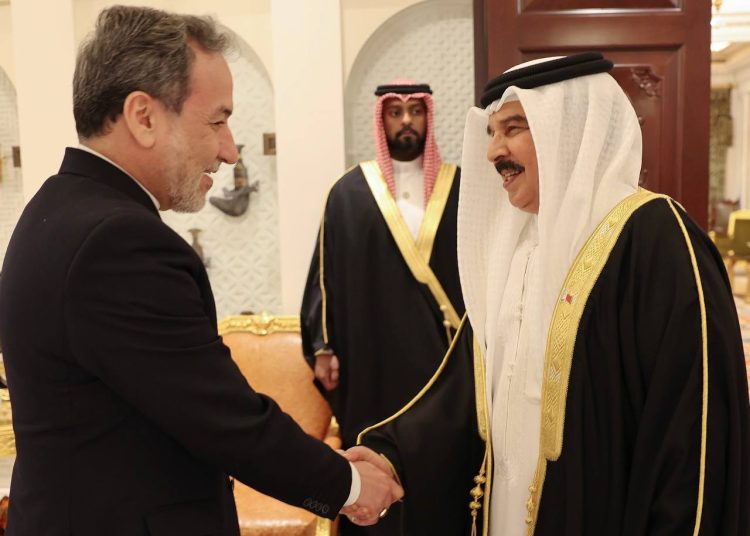The geopolitical landscape of the Middle East has long been characterized by intricate alliances, historical tensions, and a tapestry of cultural intersections. In recent months, amid the notable escalation as a result of Israeli actions in the region, Iranian officials have embarked on a series of diplomatic initiatives aimed at fostering peace and rebuilding relationships with its regional neighbors. Central to these efforts is the Iranian Foreign Minister’s recent regional tours, signaling a potential new era of cooperation with regional countries, aimed at establishing stability in the Middle East.
A pivotal moment in this diplomatic journey is the Foreign Minister’s visit to Bahrain—a state with which Iran has not maintained political relations for years. Iranian Foreign Minister, Abbas Araghchi, met with King Hamad Bin Isa Al Khalifa and Foreign Minister Abdullatif bin Rashid Alzayani on Monday evening in Manama.
Iranian Foreign Ministry spokesman, Esmaeil Baghaei, said the the talks were “useful and constructive”, focusing on “the latest developments in the region and the urgency of intensifying efforts for preserving regional security and stability against Israeli regime’s escalating carnage and atrocities, particularly in Gaza & Lebanon.”
Following the meetings, Iranian Foreign Minister said, “During the talks in Bahrain, regional issues were addressed, along with other matters. Restoring bilateral ties and the reopening of embassies should be approached gradually and with patience. Both sides are committed to resolving issues in good faith.”
The significance of this visit cannot be overstated. Despite the absence of formal ties, Bahrain’s Foreign Minister has undertaken three trips to Tehran in the past couple of months alone. These visits were not mere formalities; they included participation in the Asian Cooperation Dialogue (ACD) summit and attendance at ceremonies honoring the late President Ebrahim Raisi and the inauguration of Iran’s new President, Masoud Pezeshkian.
This burgeoning dialogue underscores a mutual willingness to bridge gaps and address longstanding issues directly. It reflects Iran’s strategic pivot towards engaging with its neighbors without the mediation of external powers—a move that could recalibrate regional dynamics significantly.
Continuity of the Neighborhood Policy
The recent diplomatic engagements are a continuation of Iran’s neighborhood policy initiated during the previous administration. This policy emphasizes direct, unmediated communication and collaboration with neighboring countries. By fostering direct interactions, Iran aims to build trust, reduce misunderstandings, and collaboratively address regional challenges.
Bahrain’s Interest for Normalization
Bahrain’s interest to normalize relations with Iran is noteworthy. In a meeting with Russian President Vladimir Putin in Moscow earlier this year, King Hamad bin Isa Al Khalifa expressed unequivocal support for normalizing relations with Iran. He emphasized that previous problems have been resolved, eliminating any justification for delaying the restoration of normal relations.
Further reinforcing this stance, a senior Bahraini official conveyed a similar message to Chinese Premier Li Qiang in Beijing, stating Bahrain’s efforts to establish normal diplomatic, trade, and cultural relations with Iran. This alignment indicates a relative convergence of interests and a shared vision for regional stability.
Facilitating Regional Consultations
The dialogues between Tehran and Manama are significant on multiple fronts. They not only pave the way for resuming bilateral relations but also enhance the potential for collaborative discussions on pressing regional issues. By reopening channels of communication, both nations can contribute to a more cohesive approach in addressing challenges such as security concerns, economic development, and cultural exchanges.
The Foreign Minister’s visit to Bahrain sets a precedent for future engagements, fostering an environment where diplomatic solutions can supersede conflicts.
Expanding Diplomatic Horizons
Following his visit to Bahrain, the Iranian Foreign Minister is scheduled to travel to Kuwait to continue his regional consultations. This visit is part of a broader diplomatic offensive that has seen high-level engagements with Turkey, Egypt, Jordan, Oman, Qatar, Saudi Arabia, Syria, and Lebanon. These efforts reflect a comprehensive strategy to rebuild and strengthen Iran’s relationships throughout the Middle East.
By reaching out to a diverse array of countries, Iran is positioning itself as a central player in regional diplomacy, capable of influencing outcomes and fostering collaborative initiatives.
Implications for Middle East Peace
The resurgence of Iran’s diplomatic activities holds profound implications for peace and stability in the Middle East. Renewed relationships and open dialogues can lead to collaborative efforts in combating Israeli crimes in Palestine, Lebanon and whole the region, addressing humanitarian crises, and managing economic challenges. Moreover, by reducing reliance on external powers to mediate regional issues, Middle Eastern countries can exercise greater sovereignty over their affairs.
The potential normalization of relations between Iran and Bahrain could serve as a microcosm of this broader shift. It exemplifies how historical adversaries can move beyond past grievances to forge partnerships that benefit their peoples and the region at large.
Conclusion
Iran’s recent diplomatic endeavors represent a trajectory towards enhanced cooperation and peace in the Middle East. By engaging directly with its neighbors, Iran is contributing to a regional environment more conducive to stability and mutual prosperity.
If sustained, this approach could herald a new chapter in Middle Eastern relations—one defined by collaboration, understanding, and shared progress.






